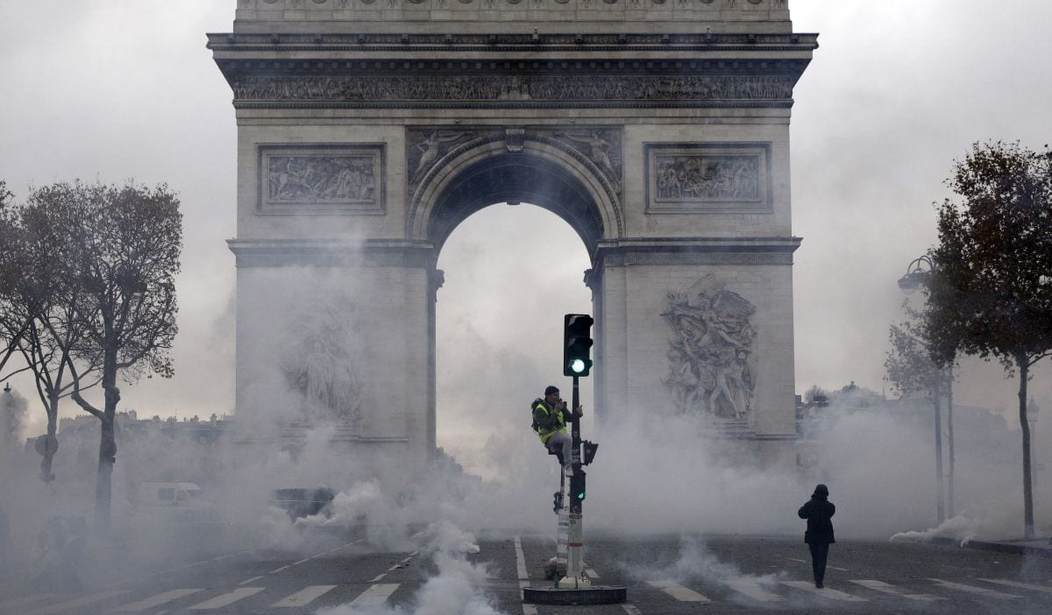A riot broke out in Paris last night over the rising price of fuel and tax increases. Police fired tear gas into the crowd and dozens of protesters were arrested.
One protester referred to the clashes between right and left on the streets of Paris as a “civil war.”
“The objective was to unite everybody here in Paris. I am disappointed because it wasn’t meant to be like this,” Thierry Paul Valette, one of the organizers of Saturday’s demonstration in Paris told CNN.
He blamed it on a “small section” of “the extreme left and the extreme right” and said it was like a “civil war.”
In total, 35 people were taken into custody.
The “yellow vest” protests, which began as a campaign against rising gas prices, have morphed into a wider demonstration against the government of President Emmanuel Macron in recent weeks,spreading as far as France’s Indian Ocean territory of Reunion.
Police say they have mobilized 3,000 officers in Paris to contain the 8,000 protesters. A security perimeter has been set up in the city center, with government buildings protected. Three people have been arrested so far.
Apparently, the government is looking to blame the whole thing on the nationalists:
At a news conference on Saturday, French Interior Minister Christophe Castaner blamed the clashes on far-right extemists infiltrating the demonstrations.
“Today, the far right has mobilized,” he told reporters. “The security forces perfectly anticipated this situation.”
Far-right political leader Marine Le Pen rejected the accusations, describing them as a “pathetic and dishonest” form of “political manipulation” by the government.
Earlier Castaner said of the protesters: “Their freedom of expression will be guaranteed, but it must not be exercised to the detriment of security, public order and the right of everybody to come and go. There is no liberty without public order.”
Last weekend a protester was accidentally run over and killed by a car, and more than 200 people were injured during a demonstration in eastern France.
Obviously, this is far more than a protest by the National Front. There probably aren’t 8,000 right-wingers in all of Paris. The government of President Macron is looking to shift blame to the far right and avoid the uncomfortable fact that the people of France are sick and tired of high taxes.
French protesters are, however, not directing their anger at OPEC for reducing oil production, or at the US administration for implementing tariffs on Iran, crippling its oil exports.
Macron is instead bearing the brunt of widespread French discontent, with many protesters furious at the current leader’s extension of environmental policies implemented under François Hollande’s government.
Notably, taxes were increased by 8 centimes last January on diesel, and by 4 centimes on petrol. Tax on diesel will also increase by another 6.4 euro cents in 2019, and by 2.9 cents for petrol. These rises follow many decades of under-taxation of diesel in France.
Macron better do something. A poll found that 80 percent of the French people are backing the protesters. And Macron’s popularity has hit a new low at just 26 percent approval. Where could this lead?
One protester, Ludivine Landrin, a 32-year-old from near Paris, explained why she was protesting. “I’m here because I am a citizen. I want the struggle to come together. I want the French state to understand that we are here together. We want another state, we want another government,” she told CNN.
“In France we have a lot of taxes. The beginning of the movement was about taxes on fuel. The movement became bigger because all the taxes are making people fed up. The Macron government is making everyone fed up — on the right and on the left. We are all fed up with Macron and his government.”
It doesn’t sound as if things are going to be calming down anytime soon.










Join the conversation as a VIP Member